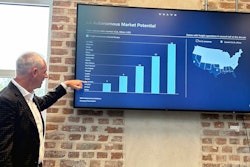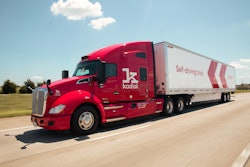California Governor Gavin Newsom on Friday vetoed Assembly Bill 316, a law that would have effectively banned driverless trucks in the state. The California Senate passed AB 316 Sept. 11.
In his veto, Newsom noted AB 316 was unnecessary for the regulation and oversight of heavy-duty autonomous vehicle technology in California, as existing law provides sufficient authority to create the appropriate regulatory framework. In 2012, the California Legislature provided the Department of Motor Vehicles (OMV) with the authority to regulate the testing and deployment of autonomous vehicles on public roads in California. As part of its oversight and regulatory responsibilities, Newsom said, OMV consults with the California Highway Patrol, the National Highway Traffic Safety Administration, and others with relevant expertise to determine the regulations necessary for the safe operation of autonomous vehicles on public roads. OMV continuously monitors the testing and operations of autonomous vehicles on California roads and has the authority to suspend or revoke permits as necessary to protect the public's safety.
The bill, which would require a human operator inside any commercial vehicle weighing over 10,000 pounds, had met resistance from the state's technology and autonomous technology stakeholders, many of which are headquartered in California, and Newsom, whose Department of Motor Vehicles (DMV) and Office of Business & Economic Development (GO-Biz) raised concerns with the proposed ban. . As a result of his veto, safety experts can continue to evaluate autonomous vehicle technology and consider appropriate regulatory action.
"We look forward to continuing to work with the California DMV, California Highway Patrol, Labor and Workforce Development Agency and other state regulators that are evaluating the future of autonomous trucking technology in the state,” said Jeff Farrah, executive director for the Autonomous Vehicle Industry Association.
The bill and its 10,001-pound gross weight limit took aim specifically at trucks and transportation. California was the first state to pass comprehensive legislation that authorized the operation of fully autonomous vehicles on public roads, noted Jim Wunderman, president and CEO, Bay Area Council, and as a result, "California is a national leader in the testing and development of autonomous vehicles and boasts more home-grown autonomous vehicle companies than any other state. Requiring a human driver to remain in AVs that weigh 10,001 pounds or more would deviate from the overwhelming majority of states’ approaches to AV regulation and California would stand alone as the only state to single out autonomous trucks and bar them from effectively deploying in the state. It is vital that California remain strong in its position of welcoming and embracing innovation in order to stay competitive in a quickly evolving market."
Chamber of Progress' Robert Singleton said the driverless trucking ban would set California back as a leader in innovation, and "unnecessarily prolong the future promise of autonomous trucking in California. Autonomous trucking is essential for the continued growth of the agricultural sector and the well-being of California's farmers, the entire Central Valley economy, and food distribution to communities around the nation," he said. "Increased demand for food and other products coupled with the lack of available human workforce threatens all farmers’ ability to transport agricultural goods nationally and overseas."
Gary Shapiro, president and CEO of the Consumer Technology Association, added that allowing AB 316 to become law would deal "a major blow" to California industry, "leaving AV trucking innovators to forge a multi-state transportation network that stretches from Arizona to the coast of Georgia," he said. "California’s logistics industry – already struggling amid spiraling shipping costs – would see further loss of freight volume to Gulf and East Coast ports and the state will fall in independent rankings of innovation friendliness, including the Consumer Technology Association’s U.S. Innovation Scorecard. It's not too late to reverse course and support AV technology in California, which promises to save lives and boost the economy."











